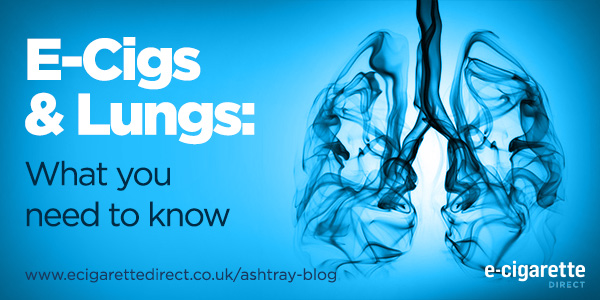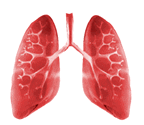
 Put electronic cigarettes and the lungs into the search engines and you'll come up with a long list of negative stories.
Put electronic cigarettes and the lungs into the search engines and you'll come up with a long list of negative stories.
But all of these stories are based on one study which did not find any evidence of lung damage (see below for more information).
What we don’t have is research on the long term effects of electronic cigarettes on health - simply because electronic cigarettes are so new.
(2017 Update: we do now have the first long term evidence on lungs - see E-Cigs and Your Lungs: What The Evidence Says for more info.)
But what we do have is:
- decades of user study into the principal ingredient of electronic cigarettes (propylene glycol)
- surveys that show increased ability to do exercise and reduced smokers cough
- anecdotal evidence that switching from tobacco cigarettes to electronic cigarettes leads to improvements in breathing and ability to exercise.
Anecdotal evidence
First, it’s worth mentioning that I don’t agree with anti-smoker Glatz that electronic cigarettes users are deluded and should be ignored :)
Thousands of people have reported health benefits on the net. The following comments are from the survey we carried out with the University of Alberta.
I smoked a pack a day for over 20 years and started e-smoking 3 weeks ago. I noticed a huge improvement in my breathing and lung capacity within days of switching to the e-cigarette.
I was a daily smoker for 25+ years. I have been using my ecig since mid-December 2008. By January I was back in the gym and execising with ease, my sense of smell returned, and I felt like a new person. Since then, my treadmill time improves by the week and I am thinking about participating in my first marathon - EVER!!
Started the electronic cigarette, and never touched another regular cigarette since the first day. I feel 1000% better. Cough is completely gone. Shortness of breath is completely gone. I don't smell like an ashtray anymore. Better sense of taste & smell.
I am a ex 2 pack a day or more smoker. I have been smoke free for two months, now. This is the longest I have gone in 22 years of smoking. Last record was 2 days. No more wheezing, have better lung capacity, taste and smell senses have improved dramatically.
was using several meds for bronchitis and (beginning) COPD, lung-capacity was 65% at start of vaping; 8 months later lungs were 95% plus all lung-related meds not taken anymore
You can also check out more of our e-cigarette research.
Short Term Results
In both the 2009 survey I conducted with the University of Alberta and a more recent survey, users reported an improvement in ability to exercise and a reduced smoker's cough.
In the second study, 70% of vapers also reported that their lung capacity improved. 22.1% of these had changes in lung capacity confirmed by a doctor.
Vapers also reported an improved ability to do strenuous jobs in the house.
See the full results of the survey here.
The Research
Airway Resistance Study
A temporary increase in airway resistance does not equate to “lung damage.”
A recent study found that using electronic cigarettes can lead to an increase in airway restriction for 10 minutes.
There were a number of flaws with the study, not least that the study was released as a press release before being peer reviewed and had undisclosed conflicts of interests - but I’ve covered that in a previous post here.
What’s important for this post is that the study found that electronic cigarettes increased airway resistance for people who had no history of lung disease (but had no effect on people with existing lung damage.)
But airway resistance is not lung disease.
Here are some other factors that cause increased airway resistance:
- hot humid air
- exercise and forced breathing
- alcohol
- sleeping
Tellingly, despite bias, and, according to Professor Carl Phillips, employing flawed science, the author was unable to find any evidence of lung damage.
More on the lung study: Gratziou ERS Press Release: Where is the science? (Professor Carl Phillips)
Propylene Glycol Research
Proplyene glycol (PG) is one of the principal ingredients in electronic cigarettes. It’s used in stage smoke to create the same vapour effect as in electronic cigarettes, and also in drinking water, air-conditioners and inhalers.
Researchers have tested inhalation in hospital wards (source:) without any negative effects, and the US Environmental Protection Agency (EPA) has concluded that it is safe for inhalation (source:)
Some people have criticised pg because it is used as an anti-freeze. That’s true - it’s used as a safe way to keep drinking water from freezing.
However, a small number of people may suffer allergies to proyplene glycol.
First Long-Term Study
In 2017 the first long term study has looked at effect of vaping on the lungs, after following a group of new vapers for three and a half years. You can find more details and an interview with the lead author here: E-Cigs Cause No Long Term Harm Says Professor.
More Research Needed - But Not at The Expense of Lives
If all the smokers in Britain stopped smoking cigarettes and started smoking e-cigarettes we would save 5 million deaths in people who are alive today. It’s a massive potential public health prize.
Professor John Britton, chair of the Tobacco Advisory Group of the Royal College of Physicians Source: BBC
Of course, there is more research needed, particularly into the effect of inhaling food flavourings. But current research and anecdotal evidence backs up scientists' opinions that using electronic cigarettes are one hell of a lot better than smoking tobacco cigarettes.
Think someone else would find this post useful? Please share using one of the buttons below :)
Article Sources
Butler J et al: Physiological factors affecting airway resistance in normal subjects and in patients with obstructive respiratory disease Dec 1959
Heavner et al: Electronic cigarettes (e-cigarettes) as potential tobacco harm reduction products: Results of an online survey of e-cigarette users TobaccoHarmReduction.org, Nov 26, 2009
Polosa. R et al: Health impact of E-cigarettes: a prospective 3.5-year study of regular daily users who have never smoked 1SCIENTIFICRepoRts, Nov 2017, 7: 13825 | DOI:10.1038/s41598-017-14043-2
Polosa. R et al et al: Health impact of E-cigarettes: a prospective 3.5-year study of regular daily users who have never smoked 1SCIENTIFICRepoRts | Aug 1999 | 7: 13825 | DOI:10.1038/s41598-017-14043-2
Rees, K: Frequency and Significance of Increased Upper Airway Resistance during Sleep, PubMed: 11029319, Aug 1999, doi.org/10.1164/ajrccm.162.4.9908052
Robinson et al: Moderate alcohol ingestion increases upper airway resistance in normal subjects, Am Rev Respir Dis. 1985 Dec;132(6):1238-41, DOI: 10.1164/arrd.1985.132.6.1238



